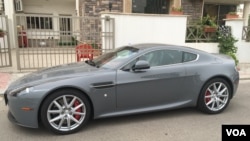A yellow Lamborghini rolled past the Tche Tche café, where men and women were lazily smoking sheesha (a syrupy tobacco mix) and drinking tea. Moments later, a large black Land Rover glided by. Looking out from the café, glass and concrete towers glinted in the sun. One of them is the five-star Divan Hotel where a rooftop restaurant boasts expensive champagne and sushi.
This is Kurdistan, and the regional government is technically broke.
Kurdish Regional Government (KRG) Prime Minister Nechirvan Barzani admits the country is experiencing a serious economic crisis. But he says the causes are largely external.
“In 2014, without any previous consultation, Baghdad cut our budget,” Barzani told VOA in a recent interview. Baghdad says it cut the budget because the regional government was selling oil and keeping the profits, and Irbil says it started selling oil to cover its budget needs. The dispute remains unresolved.
“Second, the war with Daesh,” Barzani continued, using the local term for Islamic State (IS). “Third, the arrival of 1.5 million refugees and internally displaced persons.”
Those events, combined with the drop in the price of oil, have squeezed the KRG and forced it to ask for international help from the World Bank, the IMF and the United States.
$17 billion in the red
The World Bank recently wrote that the effects of the IS conflict has indeed put the Kurdistan Region’s infrastructure under severe stress, and more than doubled the poverty rate.
The United States and the United Nations are providing humanitarian assistance for the millions of refugees and displaced families scattered around northern Iraq. Recently the United States gave $415 million to boost the capacity of Iraqi Kurdish peshmerga forces holding the front line against IS.
But analysts say the root causes of Kurdistan’s financial hardships run much deeper.
The World Bank notes the KRG is precariously dependent on oil revenues, which are 85 percent of its fiscal revenues, but only accounts for one percent of the region’s employment.
The region also has a bloated public sector, a dependency on imports, a weak financial system, a shrinking private sector and a largely cash-only economy.
The Irbil-based Middle East Research Institute in July published a report estimating the Kurdistan Regional Government’s debt at around $17 billion, and it has been struggling with its payments to international oil companies (IOCs).
That has forced the companies to re-adjust their investment budgets and others to bring lawsuits against the KRG.
According to MERI, the London Court of International Arbitration ruled that the KRG should pay $2 billion to the Dana Gas consortium. Crescent Petroleum and Dana Gas PJSC are suing the KRG for an additional $11 billion, essentially the region’s budget for a year.
“Negative developments in the relations between the KRG and IOCs can lead to major disinvestment that can hit current oil production and future projects on gas exploitation, and erode confidence of potential foreign investors in other sectors,” MERI warned in its report.
Signs of economic distress are everywhere: unfinished buildings topped by un-moving cranes, empty apartments, falling real estate prices, power cuts, water shortages, and unpaid salaries.
Short-lived prosperity
So, who owns the luxury cars and can afford a $250 dinner of champagne and sushi at the Divan hotel?
Dara Khailany, advisor to the KRG, explained that following the liberation of Iraq from Saddam Hussein in 2003, a lot of oil money flowed into the region, and Kurdistan enjoyed a decade of prosperity and growth.
Unfortunately, Khailany said, while many entrepreneurs took advantage of the money coming in, there was little knowledge on how to manage the capital inflows in order to diversify the economy, invest in sustainable development, finance needed infrastructure projects or build a robust banking sector.
Instead, those with money started building gated communities, high rises, hotels, and buying high-end car dealerships. They developed lavish life styles and kept their money out of mistrusted local banks.
“I always compare this to a family winning the lottery and not being able to build up a long-term plan, and after 15 or 30 years the family runs out of funds from the lottery and everybody is accustomed to the money, but there is no more money coming in,” Khailany told VOA.
“This is similar to what is going on right now,” he said.
Political nepotism and weak governance led to corruption, according to the Norway-based U4 Anti-corruption Resource Center, further ensuring that resources were not properly invested.
‘Subsidies for consumption’
According to MERI, KRG senior economic advisor James Parks has argued one of the main structural problems in the economy is “the extent to which the KRG spends oil rents, not for investment, but for consumption”.
Parks states the level of KRG “subsidies for consumption” through salary payments and electricity subsidies are “the largest numbers you would find anywhere,” around $10 billion a year or 40 percent of the Kurdistan Region’s GDP.
The public sector now employs 51 percent of the labor force.
Frank Gunter, economics professor at Lehigh University, said in April the economic situation in Kurdistan is not likely to change soon, and could get worse as more youth start looking for jobs.
The KRG leadership has said it is committed to righting the fiscal and economic imbalances and spurring private sector activities.
Even without the challenges of hosting millions of displaced people and fighting one of the world's most lethal terrorist organizations, such a restructuring would require tremendous political will and agility.
But analysts agree, the effort will have to be made if the Kurdistan Region of Iraq wants to avoid an economic meltdown.







